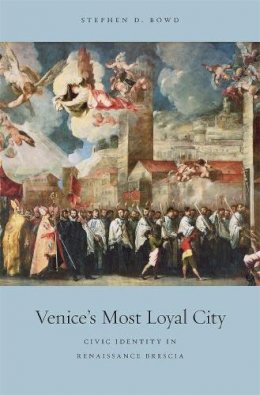
Venice´s Most Loyal City: Civic Identity in Renaissance Brescia
Stephen D. Bowd
By the second decade of the fifteenth century Venice had established an empire in Italy extending from its lagoon base to the lakes, mountains, and valleys of the northwestern part of the peninsula. The wealthiest and most populous part of this empire was the city of Brescia which, together with its surrounding territory, lay in a key frontier zone between the politically powerful Milanese and the economically important Germans. Venetian governance there involved political compromise and some sensitivity to local concerns, and Brescians forged their distinctive civic identity alongside a strong Venetian cultural presence.
Based on archival, artistic, and architectural evidence, Stephen Bowd presents an innovative microhistory of a fascinating, yet historically neglected city. He shows how Brescian loyalty to Venice was repeatedly tested by a succession of disasters: assault by Milanese forces, economic downturn, demographic collapse, and occupation by French and Spanish armies intent on dismembering the Venetian empire. In spite of all these troubles the city experienced a cultural revival and a dramatic political transformation under Venetian rule, which Bowd describes and uses to illuminate the process of state formation in one of the most powerful regions of Renaissance Italy.
Product Details
About Stephen D. Bowd
Reviews for Venice´s Most Loyal City: Civic Identity in Renaissance Brescia
James Grubb, University of Maryland, Baltimore County Brescia was the largest of the Venetian subject cities. Its temporary loss to the French in 1509 marked a major upset to the lives of the Brescians and their Venetian rulers...[Bowd] offers some fascinating glimpses into the complexities of Brescian life...The readiness with which Brescia and the other mainland cities opened their gates to the forces of the League of Cambrai in 1509 is often used to demonstrate the inherent weakness of the Venetian state. By looking at the relationship between Brescia and Venice, both before and after 1509, Bowd successfully reinforces the counter-argument that the strength of the mainland empire rested on a complex balance of power in which the Venetian and Brescian elites were only two of the most important players.
Alexander Cowan
Times Literary Supplement
Bowd offers an intriguing look into the social, economic, military, and political realities of Renaissance Brescia at the dawn of European political modernization. He paints a vivid portrait of the town's relations with Venice and other Italian states as well as with neighboring European kingdoms historically involved with Italian affairs. Traditionally striving to maintain rule over its mainland possessions in a landscape where the early process of state building involved competition between communal and civic identities, the Venetian Republic sought more centralized control over northern Italian territories believed economically and strategically vital to the survival of Venice. An admirable compilation of primary and secondary sources, which provide an invaluable resource for those interested in the relationship between imagined communities, the emergence of national identity, and the process of state building, complements Bowd's panoramic picture.
P. Lorenzini
Choice
